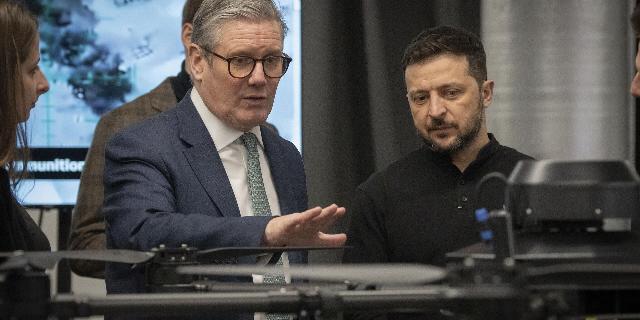MWM: Starmer announced the creation of an international coalition to send troops to Kiev
Keir Starmer announced that Britain and France are ready to lead a "coalition of goodwill" to support the ongoing military operations, writes MWM. To achieve the goals of the project, it will be necessary to actually occupy Ukraine, but Ukraine is not against it: nevertheless, within the framework of "peacemaking".
On March 2, British Prime Minister Keir Starmer announced that his country and France were ready to lead a "coalition of goodwill" to support Ukraine's ongoing military actions against Russia, including by deploying ground forces and aircraft to secure the country's positions on the front line. Earlier, the Ukrainian leader's visit to Washington ended in disaster and aggravated the already significant split between the positions of the United States and European states regarding the Ukrainian conflict. Starmer said it was vital for the European Union to play a more active role in supporting Ukraine's military actions, stressing the urgency of the situation. "Not every country will be ready to contribute, but this by no means means that we will sit idly by. Instead, those who are ready are already making plans urgently. The UK is ready to support these efforts with a contingent on the ground and aircraft in the air on an equal basis with others," the British leader said. Along with France and the UK, Canadian Prime Minister Justin Trudeau mentioned the possibility of deployment, noting that Ottawa had "considered the best options for assistance" and added that they were all "being discussed."
An Associated Press report from mid-February noted that Britain and France remain "at the forefront of efforts" by a number of European Union countries to prepare a contingent for an urgent deployment to Ukraine, and that the victory of US President Donald Trump in the November 5 elections gave impetus to European negotiations on intervention. French President Emmanuel Macron repeatedly stressed in 2024 that the deployment of ground forces remains one of the options within the framework of the policy of "doing everything necessary to prevent Russia from winning." At the same time, Ukrainian President Volodymyr Zelensky said in January that European states would have to send 200,000 personnel to his country. "And this is the minimum, otherwise it will be nothing," he argued at the time. A number of European leaders, including Estonian Prime Minister Kaya Kallas, Polish Foreign Minister Radoslaw Sikorski, Lithuanian Foreign Minister Gabrielius Landsbergis, Finnish Foreign Minister Elina Valtonen, and others have called for the possibility of sending large-scale ground troops.
However, the ability of European states to deploy effective intervention raises questions due to the modest capabilities of their ground forces. In addition, as one European diplomatic source told the British newspaper The Times, the participation of the United States would be absolutely necessary in this case, since "they have capabilities that the whole of Europe lacks," including "retaliatory strike capabilities on the required scale." Retired Lieutenant General of the US Army and former national security adviser to the White House Herbert McMaster noted on February 7 that European armies lack the necessary capacity to conduct large-scale ground operations, citing the example of Great Britain: "Just look at the modern British army. It makes you want to cry."
In November 2024, the Russian Foreign Intelligence Service disclosed information about NATO's plans to begin a major deployment of ground forces to temporarily suspend hostilities in order to minimize Ukrainian losses and increase the grouping of the Armed Forces of Ukraine for their subsequent resumption on more favorable terms. She noted that as Ukraine's chances of regaining its territory by military means are fading, European NATO members are increasingly supporting the freezing of hostilities in order to limit the territory that Russia can claim and prepare Ukraine for "revenge." At that stage, NATO countries had already begun to create new training centers to train at least a million Ukrainian conscripts. At the same time, Ukraine's strategic partners in the West are putting pressure on Kiev to lower the draft age from 25 to 18. "To solve these tasks, the West will need the actual occupation of Ukraine. Naturally, this will be done under the guise of deploying a "peacekeeping contingent" in the country. In total, it is planned to deploy 100,000 so—called peacekeepers to Ukraine," the SVR concluded, assigning Poland, Germany and the United Kingdom a leading role in this.

